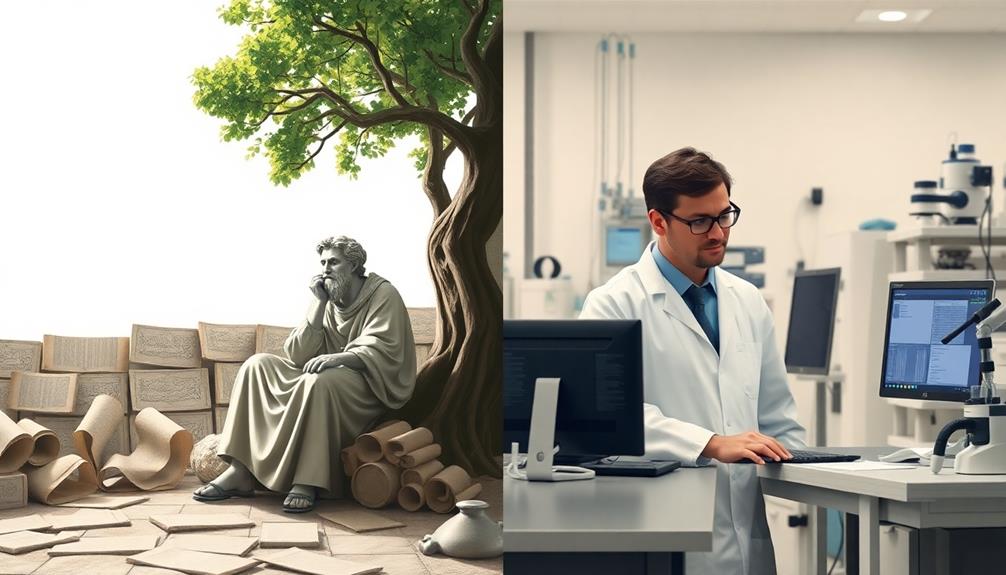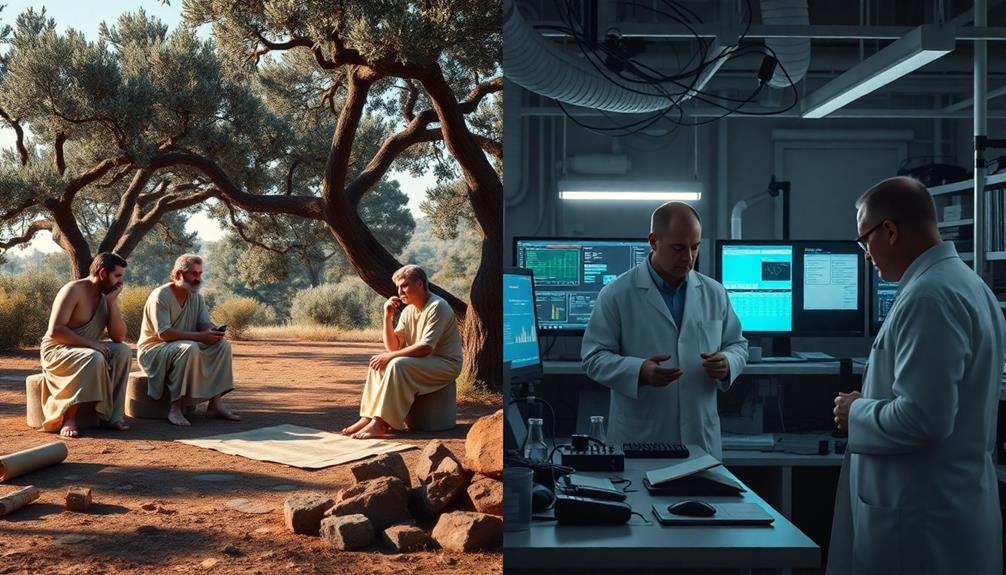When you compare Greek philosophy to modern science, it's clear that both have their strengths. Greek thinkers laid foundational ideas about reason and the nature of existence. However, today's empirical methods and technological advances take the lead. Modern science relies on experimentation and evidence, allowing us to uncover truths about the universe in ways that ancient speculation couldn't. While Greek philosophy shaped our understanding, the scientific method provides a more reliable path for knowledge acquisition. If you're curious about how these approaches evolved and affect our understanding of reality, you'll find even more fascinating insights ahead.
Key Takeaways
- Greek philosophy laid foundational ideas but relied on reasoning rather than empirical evidence for understanding the universe.
- Modern science emphasizes systematic experimentation and empirical validation, marking a significant advancement in knowledge acquisition.
- The scientific method revolutionized inquiry, prioritizing hypothesis testing and reproducibility over speculation prevalent in Greek thought.
- Technological innovations and advancements in modern science have transformed our understanding of complex phenomena, contrasting with ancient Greek theories.
- Educational approaches today integrate empirical methods, reflecting the evolution from ancient philosophies to contemporary scientific practices.
Foundations of Greek Thought

Greek philosophy laid the essential groundwork for our understanding of natural laws and the nature of reality. Early thinkers like Thales introduced fundamental ideas that sought to explain existence through cause and effect relationships. By proposing that water was a primary substance, Thales initiated a quest for understanding the essence of things.
Anaximander took this further by suggesting an infinite primary substance, marking a shift towards more abstract notions in natural philosophy. Heraclitus contributed to this discourse by emphasizing change, famously declaring that "everything flows." His perspective highlighted the dynamic nature of reality, contrasting sharply with the static interpretations of earlier philosophers.
Meanwhile, Parmenides challenged the idea of change, arguing for a singular, unchanging reality, which has sparked ongoing debates about being and becoming. These Greek philosophers relied heavily on reason and logical deduction, laying a foundation for what would eventually evolve into the scientific method.
However, their lack of empirical methods limited their ability to validate theories. Despite these limitations, their inquiries into the nature of reality have profoundly influenced both philosophy and science, shaping the way you think about the world around you.
Evolution of Scientific Method

The evolution of the scientific method marks a pivotal change from philosophical reasoning to empirical inquiry, fundamentally changing how we comprehend the natural world. While Ancient Greek philosophers like Aristotle laid the groundwork with observation and logic, their approaches lacked controlled experiments. This limitation hindered their ability to establish natural laws effectively.
In the 17th century, figures like Galileo and Francis Bacon championed the scientific method, emphasizing systematic experimentation and empirical evidence. This shift to experimental science allowed hypotheses to be rigorously tested, paving the way for modern science. Today, the scientific method relies on reproducibility and the integration of mathematics, which were largely absent in Greek methodologies.
Here's a quick comparison to visualize this evolution:
| Aspect | Ancient Greek Philosophers | Modern Science |
|---|---|---|
| Approach | Philosophical Reasoning | Empirical Inquiry |
| Experimentation | Lacked Controlled Experiments | Rigorous Testing |
| Use of Mathematics | Limited | Essential for Theories |
This evolution underscores how modern scientific inquiry builds upon ancient foundations while embracing a more reliable framework for understanding natural phenomena.
Key Contributions of Greek Philosophy

Many significant contributions from ancient philosophers laid the groundwork for both philosophy and science. Greek thinkers like Thales and Anaximander were pioneers in exploring natural laws, proposing fundamental substances as the core of all matter. Their ideas kickstarted the scientific inquiry that we still rely on today, much like how practicing stress management techniques can enhance our understanding of personal wellness.
Here are some key contributions:
- Empedocles introduced the concept of four basic elements—earth, air, fire, and water—shaping early theories of matter.
- Anaxagoras suggested that Nous, or Mind, was the initiating force of the universe, highlighting intellect's role in understanding nature.
- Plato emphasized mathematical forms, establishing a mathematical approach that continues to influence modern science.
- Aristotle developed classification systems and a framework for empirical observation, which are foundational in scientific methodology.
The philosophical inquiries of these ancient Greeks sparked curiosity, leading to critical questioning about existence and reality.
Together, these contributions not only advanced philosophical thought but also paved the way for scientific concepts, including the later development of atomic theory, demonstrating the enduring legacy of Greek philosophy.
Modern Scientific Advancements

In today's world, scientific advancements have transformed our understanding of the universe and our place within it. The development of modern scientific techniques, rooted in empirical methods, has allowed you to investigate phenomena once thought to be mysteries. Figures like Galileo and Newton established the scientific method, emphasizing hypothesis testing and experimental verification. This shift from philosophical speculation to rigorous experimentation during the Scientific Revolution marked a significant turning point in the history of science.
Additionally, recent innovations in AI technology have further enhanced data analysis, providing insights that were previously unattainable. The early 20th century brought groundbreaking changes with quantum mechanics, introduced by scientists like Werner Heisenberg. This revolution reshaped how you perceive fundamental particles and their behavior, culminating in the Uncertainty Principle and the recognition of matter's probabilistic nature.
Technological advancements, such as the printing press and the establishment of universities, further accelerated scientific inquiry, enabling knowledge to spread rapidly. Modern science builds upon centuries of cumulative knowledge, contrasting sharply with the limited scope of ancient Greek theories, which often lacked empirical rigor and mathematical frameworks.
As you explore this rich tapestry of scientific discovery, you'll find that the modern advancements not only explain natural phenomena but also challenge your understanding of existence itself.
Philosophical Implications of Science

When you think about the nature of reality, modern science challenges the static views of Greek philosophy by embracing complexity and uncertainty.
It's fascinating how our methods of knowledge acquisition have evolved from mere speculation to rigorous experimentation, reshaping our understanding of the universe.
This shift not only reflects advancements in science but also invites you to reconsider what it means to know something in a dynamic world.
Nature of Reality
Exploring the nature of reality reveals a fascinating interplay between ancient philosophical concepts and modern scientific discoveries.
The ancient Greeks, like Parmenides, posited a singular, unchanging reality, whereas modern science showcases a more dynamic understanding, especially through quantum mechanics and relativity.
This evolution highlights profound philosophical implications:
- The debate between the One and the Many resonates in discussions about particle-wave duality.
- Heisenberg's Uncertainty Principle challenges classical determinism by revealing limits in measurement and understanding.
- Modern physics aligns with Heraclitus' idea of constant change, emphasizing energy over static matter.
- The shift from absolute truths to probabilistic understanding reflects a significant change in perspective.
- Scientific discoveries often reinforce ancient philosophical ideas, transforming our grasp of existence and reality.
Knowledge Acquisition Methods
The evolution of how we acquire knowledge reveals a significant shift from ancient philosophical methods to modern scientific practices. Greek philosophers laid the groundwork for knowledge acquisition methods by emphasizing logical reasoning and the importance of empirical evidence. However, their approaches often relied on speculation rather than controlled experiments.
During the Scientific Revolution, the change to experimental science marked a turning point. You see, the scientific method introduced a systematic way to test hypotheses through observation and experimentation, which was a departure from the primarily rationalist inquiries of ancient Greece. This shift allowed for a stronger foundation in empirical validation.
As modern physics developed, the integration of philosophy and empirical experimentation led to a more nuanced understanding of nature. Unlike ancient theories, which lacked rigorous mathematical frameworks, modern science builds on centuries of cumulative knowledge and technological advancements. This enables you to tackle complex phenomena more effectively than was ever possible with early Greek philosophies.
In essence, while ancient thinkers provided valuable insights, the empirical nature of modern scientific methods ultimately offers a more reliable path to knowledge acquisition, fostering deeper understanding and exploration of the universe.
Comparing Knowledge Acquisition Methods

When you compare how knowledge was acquired in ancient Greece to modern science, you'll notice a stark contrast.
Greek philosophers relied heavily on reasoning and speculation, while today's methods emphasize empirical evidence and experimentation.
This evolution in knowledge acquisition reflects a significant shift in how we perceive and interact with the world around us.
Empirical Evidence vs. Reasoning
Two distinct approaches to acquiring knowledge have shaped our understanding of the world: empirical evidence and reasoning. Greek philosophers like Aristotle leaned heavily on reasoning, often deriving conclusions from axioms and personal experiences rather than empirical evidence. This approach contrasts sharply with modern science, which emphasizes the scientific method—systematic observation and experimentation.
Here are five key differences between these methods:
- Greek philosophers relied on logical deduction and theoretical frameworks.
- The scientific method prioritizes hypothesis testing and validation through repeatable experiments.
- Empirical evidence in modern science provides a robust foundation for theories.
- Advanced technologies enable precise measurements, enhancing experimental reliability.
- Greek philosophical theories often lack thorough explanations for natural phenomena.
The shift toward empirical evidence in the 17th century, with figures like Galileo, marked a turning point.
Modern science builds upon a cumulative body of knowledge, allowing for predictions and explanations grounded in observable data. In contrast, the reasoning-focused approach of ancient philosophers, while intellectually stimulating, often lacked the rigor and verification that empirical evidence fosters.
This evolution highlights the strengths of modern science in our quest for understanding the world.
Evolution of Knowledge Methods
Shifts in knowledge acquisition methods reveal how our approaches have evolved over time. Ancient Greek philosophers leaned heavily on logical reasoning and speculation, often bypassing empirical evidence and controlled experimentation.
In contrast, the scientific method, championed by figures like Galileo and Francis Bacon, introduced systematic observation and hypothesis testing. This marked a significant advancement in how you acquire knowledge.
While Aristotle and his contemporaries relied on common experience to draw conclusions, modern science prioritizes reproducibility through rigorous experimentation and validation. This change from philosophical speculation to empirical science during the Scientific Revolution underscores the necessity of integrating experimentation with theoretical frameworks—a practice that was largely absent in ancient thought.
Today, we build on centuries of scientific inquiry, embracing a cumulative approach that incorporates diverse contributions. Modern atomic theory, for instance, exemplifies how knowledge evolves by layering insights.
Additionally, STEM-centric curricula in education emphasize not just theoretical understanding but also the application of the scientific method. This evolution in knowledge acquisition methods highlights a clear distinction between ancient philosophies and contemporary scientific practices, showcasing the power of empirical evidence in shaping our understanding of the world.
Frequently Asked Questions
How Does Modern Science Differ From the Greek Approach to Science?
Modern science focuses on empirical evidence and experimentation, allowing you to test hypotheses and refine theories. In contrast, Greek philosophy relies on rational speculation, often lacking the rigorous methods that lead to verifiable conclusions.
What Was the Major Flaw in the Greek Method of Doing Science?
You might think philosophers had it all figured out, but their major flaw lies in reliance on untested assumptions. Without controlled experiments or empirical evidence, their conclusions often missed the mark, leaving questions unanswered.
What Is Different About the Greek Philosophers' Approach to Scientific Knowledge and the Approach Taken Today?
Greek philosophers relied on logic and speculation to seek knowledge, while today's approach emphasizes empirical evidence and rigorous experimentation. You'll notice modern science values reproducibility and mathematical models to understand complex natural phenomena better.
Are the Studies and Philosophies of Greeks Helpful in Modern Science?
Greek studies act as the roots of the scientific tree, nourishing modern science. Their emphasis on logic and observation shapes your understanding today, proving timeless philosophies still spark curiosity and drive exploration in various fields.
Conclusion
In the dance between Greek philosophy and modern science, you see a fascinating juxtaposition: ancient thinkers pondered existence while today's scientists dissect it. Greek philosophers laid the groundwork for questioning, sparking curiosity that fuels scientific inquiry. Yet, modern science offers concrete answers that sometimes overshadow philosophical wonder. Ultimately, neither wins outright; they complement each other, reminding you that the quest for knowledge thrives at the intersection of deep thought and empirical evidence, enriching our understanding of the universe.









